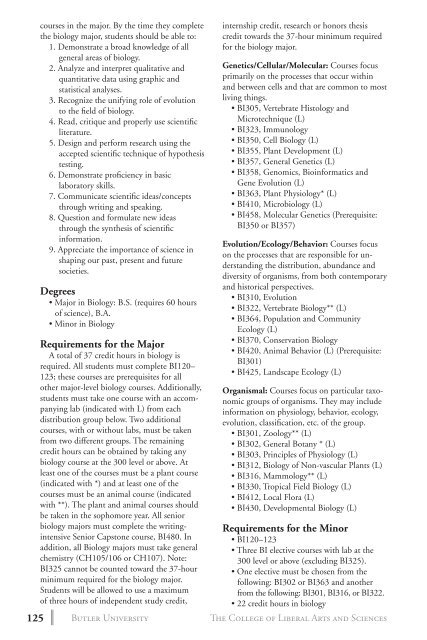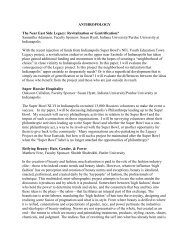The College of Liberal Arts and Sciences - Butler University
The College of Liberal Arts and Sciences - Butler University
The College of Liberal Arts and Sciences - Butler University
Create successful ePaper yourself
Turn your PDF publications into a flip-book with our unique Google optimized e-Paper software.
125<br />
courses in the major. By the time they complete<br />
the biology major, students should be able to:<br />
1. Demonstrate a broad knowledge <strong>of</strong> all<br />
general areas <strong>of</strong> biology.<br />
2. Analyze <strong>and</strong> interpret qualitative <strong>and</strong><br />
quantitative data using graphic <strong>and</strong><br />
statistical analyses.<br />
3. Recognize the unifying role <strong>of</strong> evolution<br />
to the field <strong>of</strong> biology.<br />
4. Read, critique <strong>and</strong> properly use scientific<br />
literature.<br />
5. Design <strong>and</strong> perform research using the<br />
accepted scientific technique <strong>of</strong> hypothesis<br />
testing.<br />
6. Demonstrate pr<strong>of</strong>iciency in basic<br />
laboratory skills.<br />
7. Communicate scientific ideas/concepts<br />
through writing <strong>and</strong> speaking.<br />
8. Question <strong>and</strong> formulate new ideas<br />
through the synthesis <strong>of</strong> scientific<br />
information.<br />
9. Appreciate the importance <strong>of</strong> science in<br />
shaping our past, present <strong>and</strong> future<br />
societies.<br />
Degrees<br />
• Major in Biology: B.S. (requires 60 hours<br />
<strong>of</strong> science), B.A.<br />
• Minor in Biology<br />
Requirements for the Major<br />
A total <strong>of</strong> 37 credit hours in biology is<br />
required. All students must complete BI120–<br />
123; these courses are prerequisites for all<br />
other major-level biology courses. Additionally,<br />
students must take one course with an accompanying<br />
lab (indicated with L) from each<br />
distribution group below. Two additional<br />
courses, with or without labs, must be taken<br />
from two different groups. <strong>The</strong> remaining<br />
credit hours can be obtained by taking any<br />
biology course at the 300 level or above. At<br />
least one <strong>of</strong> the courses must be a plant course<br />
(indicated with *) <strong>and</strong> at least one <strong>of</strong> the<br />
courses must be an animal course (indicated<br />
with **). <strong>The</strong> plant <strong>and</strong> animal courses should<br />
be taken in the sophomore year. All senior<br />
biology majors must complete the writingintensive<br />
Senior Capstone course, BI480. In<br />
addition, all Biology majors must take general<br />
chemistry (CH105/106 or CH107). Note:<br />
BI325 cannot be counted toward the 37-hour<br />
minimum required for the biology major.<br />
Students will be allowed to use a maximum<br />
<strong>of</strong> three hours <strong>of</strong> independent study credit,<br />
<strong>Butler</strong> <strong>University</strong><br />
internship credit, research or honors thesis<br />
credit towards the 37-hour minimum required<br />
for the biology major.<br />
Genetics/Cellular/Molecular: Courses focus<br />
primarily on the processes that occur within<br />
<strong>and</strong> between cells <strong>and</strong> that are common to most<br />
living things.<br />
• BI305, Vertebrate Histology <strong>and</strong><br />
Microtechnique (L)<br />
• BI323, Immunology<br />
• BI350, Cell Biology (L)<br />
• BI355, Plant Development (L)<br />
• BI357, General Genetics (L)<br />
• BI358, Genomics, Bioinformatics <strong>and</strong><br />
Gene Evolution (L)<br />
• BI363, Plant Physiology* (L)<br />
• BI410, Microbiology (L)<br />
• BI458, Molecular Genetics (Prerequisite:<br />
BI350 or BI357)<br />
Evolution/Ecology/Behavior: Courses focus<br />
on the processes that are responsible for underst<strong>and</strong>ing<br />
the distribution, abundance <strong>and</strong><br />
diversity <strong>of</strong> organisms, from both contemporary<br />
<strong>and</strong> historical perspectives.<br />
• BI310, Evolution<br />
• BI322, Vertebrate Biology** (L)<br />
• BI364, Population <strong>and</strong> Community<br />
Ecology (L)<br />
• BI370, Conservation Biology<br />
• BI420, Animal Behavior (L) (Prerequisite:<br />
BI301)<br />
• BI425, L<strong>and</strong>scape Ecology (L)<br />
Organismal: Courses focus on particular taxonomic<br />
groups <strong>of</strong> organisms. <strong>The</strong>y may include<br />
information on physiology, behavior, ecology,<br />
evolution, classification, etc. <strong>of</strong> the group.<br />
• BI301, Zoology** (L)<br />
• BI302, General Botany * (L)<br />
• BI303, Principles <strong>of</strong> Physiology (L)<br />
• BI312, Biology <strong>of</strong> Non-vascular Plants (L)<br />
• BI316, Mammology** (L)<br />
• BI330, Tropical Field Biology (L)<br />
• BI412, Local Flora (L)<br />
• BI430, Developmental Biology (L)<br />
Requirements for the Minor<br />
• BI120–123<br />
• Three BI elective courses with lab at the<br />
300 level or above (excluding BI325).<br />
• One elective must be chosen from the<br />
following: BI302 or BI363 <strong>and</strong> another<br />
from the following: BI301, BI316, or BI322.<br />
• 22 credit hours in biology<br />
<strong>The</strong> <strong>College</strong> <strong>of</strong> <strong>Liberal</strong> <strong>Arts</strong> <strong>and</strong> <strong>Sciences</strong>
















